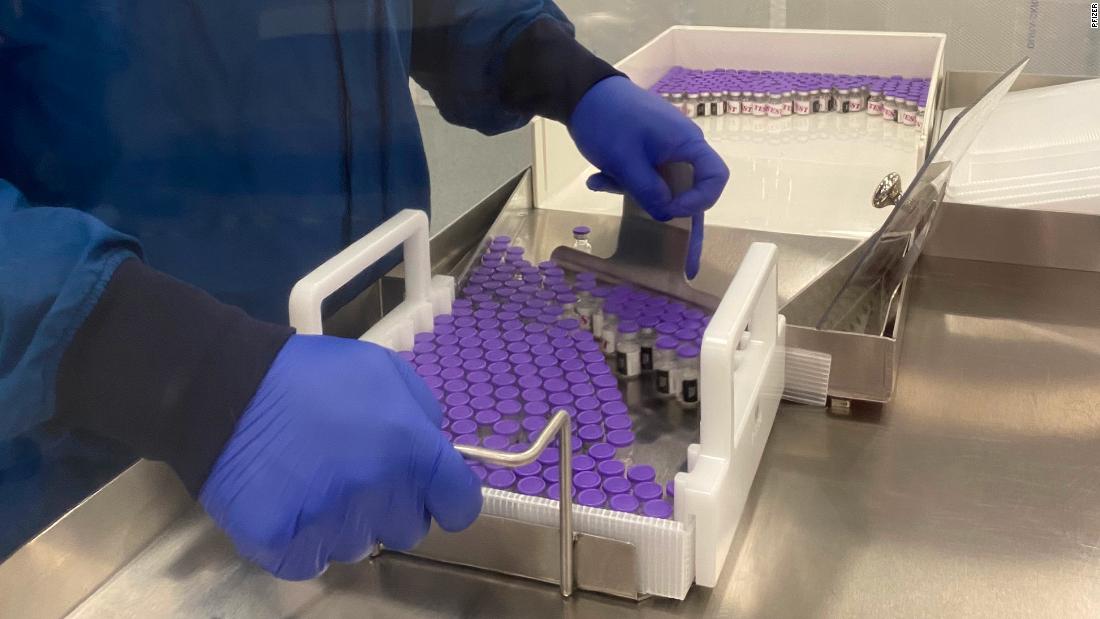
This is the first coronavirus vaccine to seek a regulatory OK in the United States.
The companies said in a statement that their vaccine candidate, known as BNT162b2, will potentially be available for use in high-risk populations in the United States by the middle to end of December. The vaccine requires two doses a few weeks apart, and protection is achieved 28 days after the first shot.
The submission to the FDA is based on results from the Phase 3 clinical trial of Pfizer's vaccine, which began in the United States on July 27 and enrolled more than 43,000 volunteers.
The final analysis from the trial found the coronavirus vaccine was 95% effective in preventing infections, even in older adults, and caused no serious safety concerns, Pfizer and its German partner, BioNTech, announced this week. The submission also includes safety data on about 100 children ages 12 to 15.
About 42% of global participants and 30% of US participants in the Phase 3 study have racially and ethnically diverse backgrounds, the companies said in a news release, and 41% of global and 45% of US participants are ages 56 to 85.
"Filing in the U.S. represents a critical milestone in our journey to deliver a COVID-19 vaccine to the world and we now have a more complete picture of both the efficacy and safety profile of our vaccine, giving us confidence in its potential," Pfizer CEO Albert Bourla said in a statement.
Moderna, another pharmaceutical company, announced Monday that early clinical trial results show its vaccine is 94.5% effective. The company plans to apply to the FDA for authorization after it accumulates more safety data later this month.
Emergency use authorization, or EUA, from the FDA is not the same as full approval. An EUA allows products to be used under particular circumstances before all the evidence is available for approval. For an EUA, the agency says it will determine whether a product's "known and potential benefits outweigh its known and potential risks."
What happens after an EUA
The FDA has scheduled a meeting of its Vaccines and Related Biological Products Advisory Committee, a group of outside experts, for December 8, 9 and 10, a source familiar with the process told CNN this week. The agency could make a decision at the end of the meeting on December 10 about whether to issue an emergency use authorization, the source said.
"It will make sense that in all likelihood the FDA will consider both applications together," the source said, considering that both the Pfizer and Moderna vaccines use the same technology and appear to have very similar safety and efficacy results from their large-scale clinical trials.
If the FDA authorizes the vaccines, they can then be immediately distributed to states, according to a presentation made last month at the US Centers for Disease Control and Prevention.
However, no one can be vaccinated until a CDC advisory committee reviews the data, recommends the vaccine, and decides which groups will receive it first.
If the FDA authorizes the vaccines, the CDC's Advisory Committee on Immunization Practices, an independent panel of experts, will meet within 24 to 48 hours, according to a CDC spokesperson.
At that meeting, the committee will determine if everyone should get the vaccine, or if some people should be excluded.
"We have all been alerted on ACIP we should be very flexible with our calendars because it's likely there won't be a lot of advanced notice given for this meeting. It will be done very, very quickly," Dr. William Schaffner, a committee member, told CNN this week.
Once ACIP issues its recommendations, vaccinations can be given.
"We have a plan in places that the moment that the FDA concludes that that vaccine is safe and effective, we have a system in place to begin within 24 hours to ship that to hospitals and health care officials and 24 hours after that injecting that vaccine into Americans," Vice President Mike Pence said during a White House Coronavirus Task Force briefing on Thursday.
States are currently working out the details of running vaccination clinics. The Pfizer vaccine is particularly complicated, since it must be stored at minus 75 degrees Celsius, and doctors' offices and pharmacies typically do not have freezers that go that low.
The first groups expected to receive the vaccine are health care workers, the elderly, essential works such as police officers, and those with underlying medical conditions.
"to" - Google News
November 20, 2020 at 09:20PM
https://ift.tt/2KrPAu0
Pfizer and BioNTech to submit to FDA today for emergency authorization for their coronavirus vaccine - CNN
"to" - Google News
https://ift.tt/368wPko
https://ift.tt/2YvVgrG

No comments:
Post a Comment